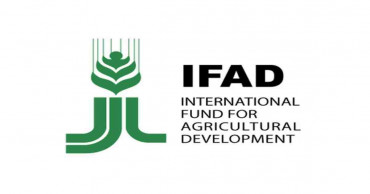International Fund for Agricultural Development
Digitalization: Global remittances flows expected to reach US$5.4 trillion by 2030
Global remittances, the hard-earned money sent by migrant workers to their family members in low- and middle-income countries (LMICs), grew by 8.6 per cent in 2021, says the International Fund for Agricultural Development (IFAD).
Despite predictions that the COVID-19 pandemic would reduce remittance flows, the momentum was sustained due to a 48 per cent increase in money sent through mobile channels, according to the report MobileRemit Africa launched on Thursday by IFAD.
Also read: BB moves to encourage greater flow of remittance to boost forex
“The digitalization of remittances, particularly through mobile channels, is a great opportunity to boost rural development as over half of these funds go to rural areas. Digitalization reduces fees and other transactions costs like travel time, making the process more convenient and safer while promoting digital and financial inclusion,” said Gilbert F. Houngbo, President of IFAD, speaking on the International Day of Family Remittances.
Remittances flow (US$605 billion) more than tripled the total amount of international official development assistance (US$178.6 billion).
Money sent home by over 200 million migrant workers around the world this year is expected to reach US$630 billion, providing a lifeline for more than 800 million family members.
“Remittances lift people out of poverty, put food on the table, pay for education, cover health expenses, allow housing investments and many other family goals beyond consumption,” added Houngbo.
The aggregated flows of family remittances to LMICs are expected to reach US$5.4 trillion by 2030, a figure equivalent to twice the GDP of Africa in 2021.
The upward trend of remittances growth is likely to moderate in 2022 as inflation erodes wages while pandemic-related support programmes end in rich countries.
Also read: Bangladesh receives record $2.09 billion remittance in April
The war in Ukraine is expected to impact global figures, as it is triggering a sharp decline in transfers to Russia’s neighbouring countries, where remittances can account for as much as 30 per cent of their GDP.
According to the analysis of seven African countries conducted by IFAD in the MobileRemit Africa report, the use of mobile channels for remittances by migrant workers and their families has brought an overall reduction in costs.
However, the African remittance market remains the most expensive, with an average cost of 7.83 per cent against the global average of 6 per cent.
Reducing the cost to the 3 per cent goal agreed in the Sustainable Development Goals (SDGs) would lead to an additional US$4 billion per year being received by migrant families in Africa. Mobile transfer costs are already in line with the SDG target of 3 per cent.
3 years ago
IFAD issues 1st bond connecting capital markets to rural poor around world
The International Fund for Agricultural Development (IFAD) on Wednesday issued its first sustainable development bond with Folksam, a leading insurance and pension fund in Sweden investing in a US$100 million bond.
The entry to capital markets sets the stage for IFAD’s increased investment in food security, rural development and economic growth at a time when the war in Ukraine is pushing global food, fertilizer and energy prices to record levels, putting millions more rural people already reeling from the COVID-19 pandemic at risk of falling into hunger and poverty.
IFAD is the first United Nations Fund and the only UN body and specialized agency other than the World Bank Group to enter capital markets, following the completion of its credit rating process in 2021 which resulted in a AA+ rating from both Standard & Poor’s and Fitch, said a media release received from Rome.
“This inaugural transaction is a key milestone for IFAD and an opportunity to significantly step up its financing to build the resilience of rural populations,” said Katherine Meighan, IFAD’s General Counsel and acting Chief Financial Officer.
Read: Bangladesh a star of growth, says IFAD urging continued focus on rural areas
“We urgently need to scale-up investments to ensure that rural populations who produce one third of the world’s food can continue to feed communities and offer a decent future to their children.”
Small-scale farmers are vulnerable to many shocks in particular climate change impacts, with yields affected by extreme weather events, higher temperatures and changing weather patterns.
Currently one in ten people globally do not have enough to eat, while hunger has been on the rise for the last five years reaching more than 800 million people in 2020.
“The proceeds of IFAD’s first bond issuance will augment IFAD’s capacity to help small-scale farmers adapt to climate change, access supply chains and markets, and produce more diverse foods, thus stimulating rural economies and directly contributing to many Sustainable Development Goals, in particular ending hunger and poverty,” said Natalia Toschi, Head of Funding at IFAD’s Financial Operations Department.
“The need for investment in agriculture is great. The war in Ukraine has, in addition to the suffering of the Ukrainian people, meant record high prices for energy, food and fertilizers. In addition, there is climate change, which is already affecting farmers in many parts of the world. There is therefore an imminent risk of a famine in the world's poorer countries,” said Ylva Wessén, President and CEO of Folksam.
Read: FS seeks SG’s role in transforming SAARC a meaningful regional org
Christopher Flensborg, Head of Climate and Sustainable Finance at SEB, which arranged the bond transaction said they are very happy to welcome IFAD to the bond market.
“Their mandate has never been more important and it is a privilege to assist IFAD to broaden the knowledge around food challenges, solutions and security. To enable private capital to support their effort is essential and we are pleased to see that the Folksam Group takes the lead in this effort and are looking forward to bring additional food and agriculture related finance to the market.”
In recent years, IFAD has been exploring new funding models to empower vulnerable rural populations, meet the changing needs of developing countries which borrow from IFAD and reach its objective of doubling its impact on reducing poverty and hunger by 2030.
Read: It's a priority for IFAD to invest in Bangladesh, says its regional director
3 years ago
Food systems that ignore needs of poor are doomed to fail: IFAD
President of the International Fund for Agricultural Development (IFAD) Gilbert F Houngbo on Friday said their attempts to create more equitable and sustainable food systems are doomed to fail if they ignore the challenges and needs of rural people in the world’s poorest countries.
“Rural people have long been sidelined in food value chains. While they toil to produce much of our food, too often they receive a pittance for their efforts and are left vulnerable to shocks,” said the President of IFAD, the UN agency which leads on tackling rural poverty and hunger.
READ: IFAD President lauds Bangladesh for significant projects implementation capacity
Ahead of the UN Food Systems pre-Summit that begins in Rome on Monday, he said this is a critical moment to address the inequity of food systems.
“Without concrete actions that result in real changes for rural producers, hunger and poverty will only grow, and increased instability and migration will follow,” he added.
Rural small-scale farmers produce about a third of global food, and supply up to 80 per cent of food in parts of Africa and Asia.
Although they play a major role in keeping food systems functioning, they themselves often go hungry.
In 2020, this was exacerbated by climate change, conflict, and the impacts of the Covid-19 pandemic, resulting in a dramatic increase in global hunger, according to a report jointly released by five UN agencies including IFAD last week.
One in 10 now go hungry
At the pre-Summit (26-28 July), IFAD will join thousands of governments, companies, development agencies, farmers and civil society organisations to discuss ways to transform how we grow, process, sell and consume food to make it more sustainable and equitable.
The pre-Summit aims to establish a common vision, launch commitments and mobilize partnerships for financing.
“If we want to fix food systems, listen to the people who work in them,” said Houngbo. “Rural small-scale producers are the ones who understand their own challenges and can guide what solutions are needed.”
To gather input from rural producers across the world, IFAD launched its Rural Voices platform this week. Shirley Casachagua, from a remote area in Peru, is one of the contributors.
“No matter what continent, country or republic you live in, we are all children of the earth and we live off it,” she said. “I would like to ask world leaders to be a watchdog to large industries because they contribute more to climate change and this hurts all of us who live on the land.”
READ: IFAD names new country director for Bangladesh
IFAD has also collaborated with Farm Radio International to conduct surveys with remote rural people through radio programmes, and it has supported the organization of over 40 independent dialogues led by farmers’ organizations and Indigenous Peoples’ groups which will feed into the Summit process.
IFAD is calling for a number of key changes to food systems, including to commit financing and political will to ensure rural people can access the inputs, markets, financial services, technology and information they need to grow their businesses, adapt to climate change, protect the environment and biodiversity, and be more resilient to economic, health and weather shocks and to make food systems fairer and more equitable. Food systems depend on people’s labour, and those who work in them must earn decent livelihoods.
IFAD is also leading an initiative to unlock the potential of public development banks across the world to finance food systems transformation and help shift investments to more environmentally sustainable and fairer systems, and is hosting the official session at the pre-Summit: Mobilizing trillions for food systems transformation — financing for impact, leveraging the pivotal role of public development banks.
READ: IFAD to provide US$18.07mn to Bangladesh for COVID-19 recovery activities
Following the Food Systems Summit in September, countries will develop their own pathways to transform food systems, and IFAD will support its Member States to develop their strategies and put them into action.
4 years ago
IFAD to provide US$18.07mn to Bangladesh for COVID-19 recovery activities
The International Fund for Agricultural Development (IFAD) will provide Bangladesh with an additional loan of US$ 18.07 million to rebuild microenterprises and support smallholders, who have been affected adversely by the COVID-19 pandemic.
5 years ago
IFAD supports smallholder farmers with nutritious homestead vegetable gardening kits
The International Fund for Agricultural Development (IFAD) and the Ministry of Agriculture (MoA) have started distributing homestead vegetable gardening (HVG) kits among 26,000 smallholder farmers in coastal Bangladesh to combat the effects of the COVID-19 pandemic.
5 years ago
Public Development Banks for greater commitment to tackle global hunger, poverty
Thirteen Public Development Banks (PDBs), for the first time in history, made a joint commitment on Wednesday to strengthen investments in food and agriculture in the context of a global pandemic and a changing climate, with more signatories expected in the coming days.
5 years ago
PKSF launches $200mn project to transform rural microenterprise
Palli Karma-Sahayak Foundation (PKSF), an apex development agency of the country, has floated a new project titled ‘Rural Microenterprise Transformation Project (RMTP)’ as a major boost to the Bangladesh’s microenterprise sector.
5 years ago
IFAD supports flood warning system strengthening in 3 districts
A memorandum of understanding (MoU) has been signed between Local Government Engineering Department (LGED) and Department of Disaster Management (DDM) in a bid to strengthen the existing flood forecasting and warning system under a project financed by International Fund for Agricultural Development (IFAD).
5 years ago
Declare remittance service providers essential businesses: IFAD
With a significant decline in money sent home by migrants due to COVID-19 pandemic, the United Nations' International Fund for Agricultural Development (IFAD) urged governments to declare remittance service providers essential businesses during this crisis.
5 years ago


.jpg)

.jpg)


.jpg)
.jpg)


